英语各种介词的用法
英语介词的用法

⑴时间或地点介词in、on、at的用法区别:表示时间时, in表示在一段时间里(在将来时句子中则表示在一段时间之后), on表示在具体的某一天或者某天的上下午等, at表示在某个时刻或者瞬间;表示地点时, in表示在某个范围之内, on表示在某个平面上或与一个面相接触,at则表示在某个具体的场所或地点。
如:He was born on the morning of May 10th.(他出生于五月十日的早晨)/ I usually get up at 7:00 in the morning.(我通常在早上的七点钟起床) / His glasses are right on his nose.(他的眼镜就架在他的鼻子上)/ He is at the cinema at the moment.(此刻他正在电影院)⑵after与in表示时间的用法区别:“after+(具体时刻/从句)”表示“在…时刻之后”常用于一般时态;“in+(一段时间)”表示“在(多久) 之后”,常用于将来时态。
如:He said that he would be here after 6:00.(他说他六点钟之后会来这儿)/ My father is coming back from England in about a month.(我父亲大约一个月以后从英国回来)⑶since与for表示时间的用法区别:“since+(具体时刻/that-从句)”表示“自从…起一直到现在”,“for +(一段斶间)”表示“总共有…之久”,都常用于完成时态;如:Uncle Li has worked in this factory since 1970.(李叔叔自从1970年起就在这家工厂工作了)/ Uncle Li has worked in this factory for over 30 years. (李叔叔在这家工厂已经工作了30多年)⑷by、in与with表示方式的用法区别:都可以表示“工具、手段”,但是by主要表示“乘坐”某个交通工具或“以……方式”,在被动句中可以表示动作的执行者;in 表示“使用”某种语言/文字,with表示“使用”某个具体的工具、手段。
超全的英语介词用法归纳总结
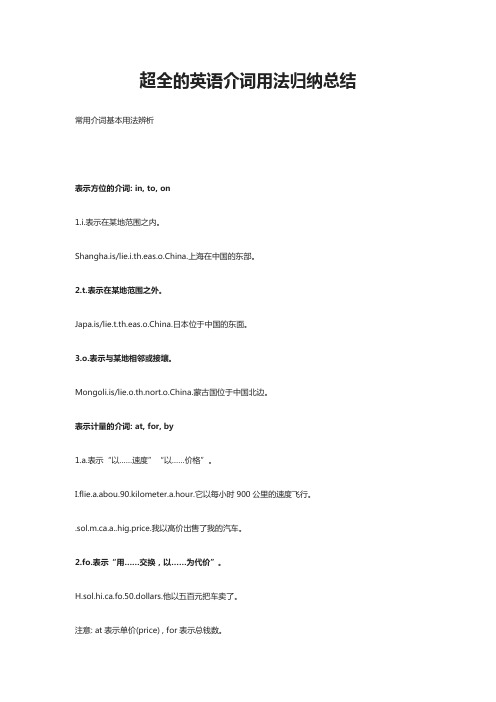
超全的英语介词用法归纳总结常用介词基本用法辨析表示方位的介词: in, to, on1.i.表示在某地范围之内。
Shangha.is/lie.i.th.eas.o.China.上海在中国的东部。
2.t.表示在某地范围之外。
Japa.is/lie.t.th.eas.o.China.日本位于中国的东面。
3.o.表示与某地相邻或接壤。
Mongoli.is/lie.o.th.nort.o.China.蒙古国位于中国北边。
表示计量的介词: at, for, by1.a.表示“以……速度”“以……价格”。
I.flie.a.abou.90.kilometer.a.hour.它以每小时900公里的速度飞行。
.sol.m.ca.a..hig.price.我以高价出售了我的汽车。
2.fo.表示“用……交换,以……为代价”。
H.sol.hi.ca.fo.50.dollars.他以五百元把车卖了。
注意: at表示单价(price) , for表示总钱数。
3.b.表示“以……计”, 后跟度量单位。
The.pai.hi.b.th.month.他们按月给他计酬。
Her.egg.ar.sol.b.weight.在这里鸡蛋是按重量卖的。
表示材料的介词: of, from, in1.o.成品仍可看出原料。
Thi.bo.i.mad.o.paper.这个盒子是纸做的。
2.fro.成品已看不出原料。
Win.i.mad.fro.grapes.葡萄酒是葡萄酿成的。
3.i.表示用某种材料或语言。
Pleas.fil.i.th.for.i.penci.first.请先用铅笔填写这个表格。
The.tal.i.English.他们用英语交谈。
表示工具或手段的介词: by, with, on1.b.用某种方式, 多用于交通。
.wen.ther.b.bus.我坐公共汽车去那儿。
2.with表示“用某种工具”。
H.brok.th.windo.wit..stone.他用石头把玻璃砸坏了。
15个英语最常见的介词用法-极简英语

15个英语最常见介词(in on at of for...)的深层次含义英文中15个最常见的介词in/ on/at/of/ for/by /with/ from/to/as/ about/ around/ off/ through/ over一、in (在..里面)1.表示真实的位置: in the car/room2表示抽象的位置: in the book/movie3.表示状态: in danger, in trouble; in anger3.表示时间: in the morning/afternoon/evening. in April; in 20104.表示方式: in the way; in English5.表示穿着: in black shoes/T-shirt二、on (紧紧地接触-连着)1.表示真实的位置: on the table/wall2.表示抽象的位置: on the radio/TV; on the topic/event3.表示具体的时间: on Monday; on Monday morning; on May 4th4.表示状态: on duty; on holiday; the game is on三、at(在.点上)1.表示真实的位置: at home/the company/the store2.表示抽象的位置: be good/bad at English3.表示具体的时间: at 3 pm;at night; at the age of 204.表示状态: at work-在工作; at table-在吃饭四、Of(的-从属关系)1.表示"无生命主体的":the window of the room; top of the mountain...2.某某市: the city of Bejing3.表示数量: a piece/bx/bottle/pair.. of五、for(为了/因为/对时间/对.而言/支持赞成)1.表示为了":go for a walk; I come here fr my schoolbag2.表示"因为": Thank you for helping me; for the reason3.表示"时间"和: for 3 days; for a week; for a year4.表示对..而言": It is important for me5.表示”支持,赞成": Are you for this plan or against it?六、by(通过.交通工具/在.附近/街至.时间/被)1.表示"通过.交通工具":by train/subway/plane/air/ship/seaI learn English by watchingEnglish movies.2.表示在附近":a table by the window; the house is by the lake3.表示"截至到..时间":by the end of next week; by 20194.表示"被(被动语态)":English is spoken by people all over the world.七、with (伴随)1.表示"和.起":go with:play with;make friends with;cooperate with2.表示"携有,带有":a county with a long history; a house with a big garden3.表示..工具:cut the apple with the knife4.表示"伴随":with the development of the society;with the help of my teacher;I don't have any cash with me.八、from (远离)1.表示"来自":I am/come from China;a gift from my best friend;a man from America2.由"远离"来记短语:stop/prevent/keep sb from doing sth阻止某人做某事be away from...远离...be different from与.不同be absent from缺席....how far is it from here?它离这远The paper is made from wood.这纸是由木头制成的3.表示..到": from...to...由"指向"来理解下列用法:The road leads to Paris.这条路通往巴黎Smoking is harmful to your health.吸烟有害健康the answer to the question.这个问题的答案九、to (指向..)contribute to对..做贡献on one's way to... 在某人去某地的路上belong to属于..be used to doing sth习惯于做某事lead to...导致十、as作为He works as a tour guide.他作为导游工作。
介词英语的用法总结
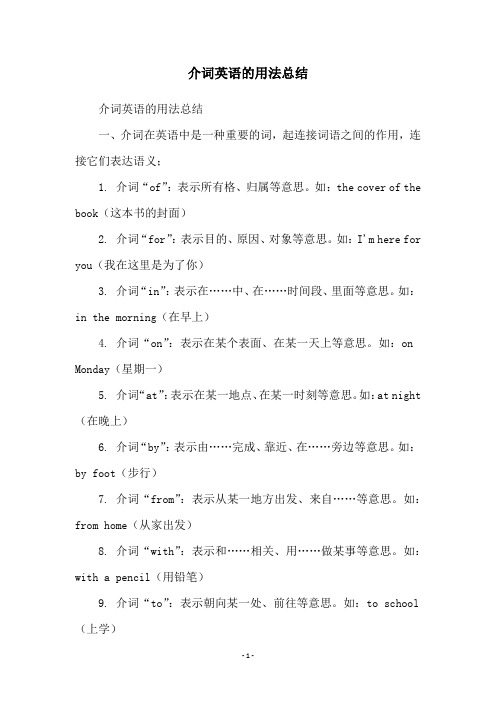
介词英语的用法总结介词英语的用法总结一、介词在英语中是一种重要的词,起连接词语之间的作用,连接它们表达语义;1. 介词“of”:表示所有格、归属等意思。
如:the cover of the book(这本书的封面)2. 介词“for”:表示目的、原因、对象等意思。
如:I'm here for you(我在这里是为了你)3. 介词“in”:表示在……中、在……时间段、里面等意思。
如:in the morning(在早上)4. 介词“on”:表示在某个表面、在某一天上等意思。
如:on Monday(星期一)5. 介词“at”:表示在某一地点、在某一时刻等意思。
如:at night (在晚上)6. 介词“by”:表示由……完成、靠近、在……旁边等意思。
如:by foot(步行)7. 介词“from”:表示从某一地方出发、来自……等意思。
如:from home(从家出发)8. 介词“with”:表示和……相关、用……做某事等意思。
如:with a pencil(用铅笔)9. 介词“to”:表示朝向某一处、前往等意思。
如:to school (上学)10.介词“for”:表示为了……、把……作为等意思。
如:for fun (为了好玩)11.介词“as”:表示作为、当……时等意思。
如:as a teacher (作为一个老师)12.介词“over”:表示在……上、穿过等意思。
如:over the bridge (过桥)13.介词“since”:表示从……起、既然等意思。
如:since then (从那时起)14.介词“into”:表示到……里面、转向等意思。
如:into the room(进房间)二、最后,需要强调的是,介词的使用要灵活搭配,以正确表达出英语句子的意思,以便达到更好的英语表达效果。
史上超全的英语介词用法归纳总结!不看太可惜了
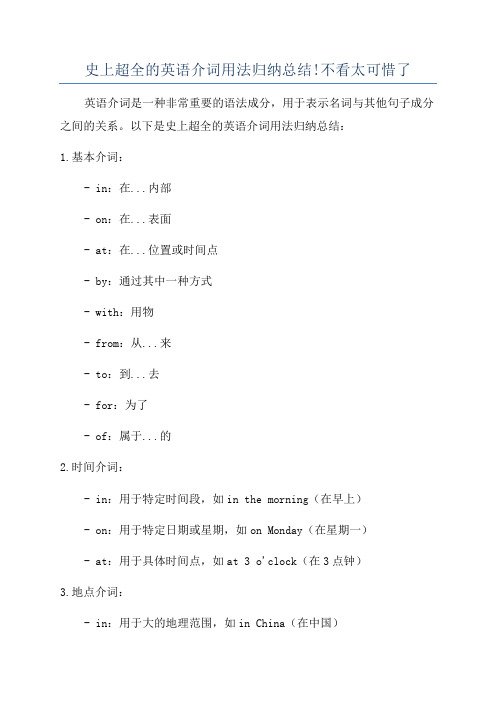
史上超全的英语介词用法归纳总结!不看太可惜了英语介词是一种非常重要的语法成分,用于表示名词与其他句子成分之间的关系。
以下是史上超全的英语介词用法归纳总结:1.基本介词:- in:在...内部- on:在...表面- at:在...位置或时间点- by:通过其中一种方式- with:用物- from:从...来- to:到...去- for:为了- of:属于...的2.时间介词:- in:用于特定时间段,如in the morning(在早上)- on:用于特定日期或星期,如on Monday(在星期一)- at:用于具体时间点,如at 3 o'clock(在3点钟)3.地点介词:- in:用于大的地理范围,如in China(在中国)- on:用于较小的地理范围或表面,如on the street(在街上)- at:用于具体地点,如at the supermarket(在超市)4.方向介词:- to:表示到达一些地方,如go to school(去学校)- into:表示进入一些地方,如go into the house(进入房子)- out of:表示离开一些地方,如get out of the car(离开车)5.原因介词:- because of:由于,如He is late because of the traffic(他因为交通堵塞而迟到)- due to:由于,如The flight was canceled due to bad weather(因为恶劣天气,航班被取消)6.动词短语介词:- look after:照顾,如She looks after her younger brother (她照顾她的弟弟)- take care of:照顾,如He takes care of his plants(他照顾他的植物)7.形容词短语介词:- interested in:对...感兴趣,如She is interested in music (她对音乐感兴趣)- good at:擅长...,如He is good at playing basketball(他擅长打篮球)8.其他常见介词用法:- with regard to:关于,如With regard to the matter, I have something to say(关于这件事,我有些话要说)- instead of:代替,如I will go instead of him(我将代替他去)- according to:根据,如According to the weather forecast, it will rain tomorrow(根据天气预报,明天会下雨)以上是一些常见的英语介词用法总结,希望能帮到你!。
英语介词的用法总结(完整版)
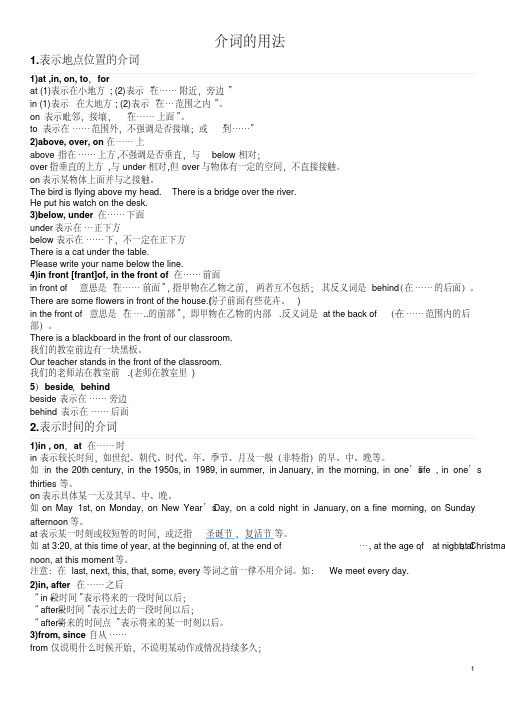
介词的用法1.表示地点位置的介词1)at ,in, on, to,forat (1)表示在小地方; (2)表示“在……附近,旁边”in (1)表示在大地方; (2)表示“在…范围之内”。
on 表示毗邻,接壤,“在……上面”。
to 表示在……范围外,不强调是否接壤;或“到……”2)above, over, on 在……上above 指在……上方,不强调是否垂直,与below相对;over指垂直的上方,与under相对,但over与物体有一定的空间,不直接接触。
on表示某物体上面并与之接触。
The bird is flying above my head. There is a bridge over the river.He put his watch on the desk.3)below, under 在……下面under表示在…正下方below表示在……下,不一定在正下方There is a cat under the table.Please write your name below the line.4)in front [frant]of, in the front of在……前面意思是“在……前面”,指甲物在乙物之前,两者互不包括;其反义词是behind(在……的后面)。
in front of…There are some flowers in front of the house.(房子前面有些花卉。
)in the front of 意思是“在…..的前部”,即甲物在乙物的内部.反义词是at the back of…(在……范围内的后部)。
There is a blackboard in the front of our classroom.我们的教室前边有一块黑板。
Our teacher stands in the front of the classroom.我们的老师站在教室前.(老师在教室里)5)beside,behindbeside 表示在……旁边behind 表示在……后面2.表示时间的介词1)in , on,at 在……时in表示较长时间,如世纪、朝代、时代、年、季节、月及一般(非特指)的早、中、晚等。
英语语法介词用法
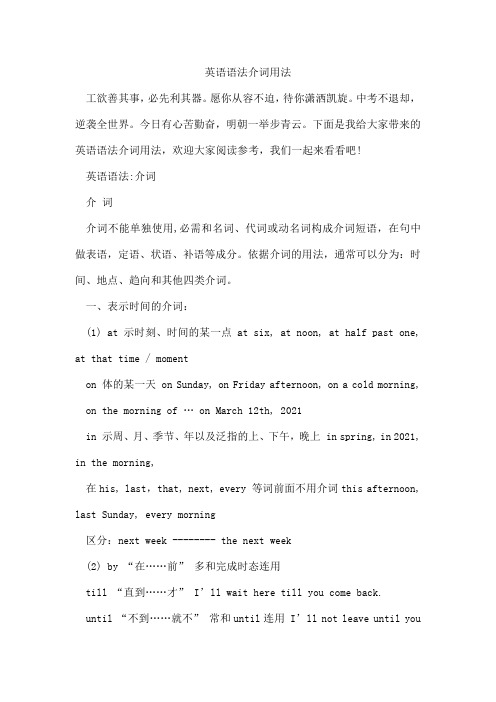
英语语法介词用法工欲善其事,必先利其器。
愿你从容不迫,待你潇洒凯旋。
中考不退却,逆袭全世界。
今日有心苦勤奋,明朝一举步青云。
下面是我给大家带来的英语语法介词用法,欢迎大家阅读参考,我们一起来看看吧!英语语法:介词介词介词不能单独使用,必需和名词、代词或动名词构成介词短语,在句中做表语,定语、状语、补语等成分。
依据介词的用法,通常可以分为:时间、地点、趋向和其他四类介词。
一、表示时间的介词:(1) at 示时刻、时间的某一点 at six, at noon, at half past one, at that time / momenton 体的某一天 on Sunday, on Friday afternoon, on a cold morning, on the morning of … on March 12th, 2021in 示周、月、季节、年以及泛指的上、下午,晚上 in spring, in 2021, in the morning,在his, last,that, next, every 等词前面不用介词this afternoon, last Sunday, every morning区分:next week -------- the next week(2) by “在……前” 多和完成时态连用till “直到……才” I’ll wait here till you come back.until “不到……就不” 常和until连用I’ll not leave until youcome back.(3) in 过……以后, 大多用于将来时 after 多用于过去时(4) since + 过去的一个时间点 (表示时间段, 从……开头到现在) for + 一段时间二、表示场所、方向的介词:(1)at 表示比较详细的地点 at 37 Renming Roadin 表示比较宽敞的地点 in Renming Street(2)above斜上方-------below斜下方 over正上方-------under正下方on 两物体有接触(3) be tween…and..在……和……之间 among在……中间(三者以上)(4) across (从物体表面)跨越, 越过 through (从物体中间)穿透, 穿越(5)in 在……里面(表示静止的位置) into 进入,表示运动方向,常用在表示动作的动词之后, 如 go, come, walk, jump, run 等 into的反义词是out of(6)to 到 (目底地)或方向 towards 指朝着某方向,而不是目的地.He walked towards the beach.三、其它介词1.with (1)在一起; (2)有; (3)用某种工具in 用什么材料或语言,或表示衣着,声调特点等by 用......手段2.Like 象......一样as 作为;根据,象......一样(连词)+ 句子3.for(1)为了(表示目的或缘由) (2)(后面加一段时间)表示时间段英语中考:介词短语[介词短语聚焦]“介词+名词/代词”所构成的短语称为介词短语。
英语介词用法总汇-全
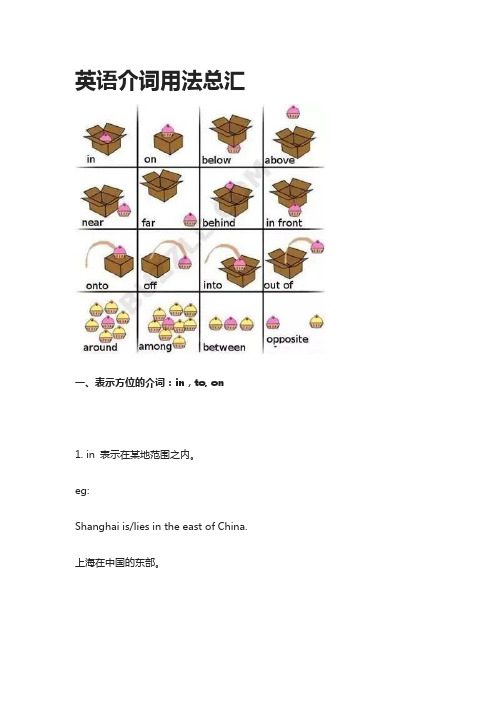
英语介词用法总汇一、表示方位的介词:in,to, on1. in 表示在某地范围之内。
eg:Shanghai is/lies in the east of China. 上海在中国的东部。
2. to 表示在某地范围之外。
eg:Japan is/lies to the east of China.日本位于中国的东面。
3. on 表示与某地相邻或接壤。
eg:Mongolia is/lies on the north of China. 蒙古国位于中国北边。
二、表示计量的介词:at, for, by1. at表示“以……速度”“以……价格”。
eg:It flies at about 900 kilometers a hour. 它以每小时900公里的速度飞行。
I sold my car at a high price.我以高价出售了我的汽车。
2. for表示“用……交换,以……为代价”。
eg:He sold his car for 500 dollars.他以五百元把车卖了。
注意:at表示单价(price) ,for表示总钱数。
3. by表示“以……计”,后跟度量单位。
eg:They paid him by the month.他们按月给他计酬。
Here eggs are sold by weight.在这里鸡蛋是按重量卖的。
三、表示材料的介词:of, from, in1. of成品仍可看出原料。
eg:This box is made of paper.这个盒子是纸做的。
2. from成品已看不出原料。
eg:Wine is made from grapes.葡萄酒是葡萄酿成的。
3. in表示用某种材料或语言。
ge:Please fill in the form in pencil first. 请先用铅笔填写这个表格。
They talk in English.他们用英语交谈。
注意:in指用材料,不用冠词;而with指用工具,要用冠词。
英语常见介词的用法

介词用法口诀早、午、晚要用in,at黎明、午夜、点与分。
年、月、年月、季节、周,阳光、灯、影、衣、冒in。
将来时态in...以后,小处at大处in。
有形with无形by,语言、单位、材料in。
特征、方面与方式,心情成语惯用in。
介词at和to表方向,攻击、位置、恶、善分。
日子、日期、年月日,星期加上早、午、晚,收音、农场、值日on,关于、基础、靠、著论。
着、罢、出售、偷、公、假,故意、支付、相反,准。
特定时日和"一……就",on后常接动名词。
年、月、日加早、午、晚,of之前on代in。
步行、驴、马、玩笑on,cab,carriage则用in。
at山脚、门口、在当前,速、温、日落、价、核心。
工具、和、同随with,具有、独立、就、原因。
就……来说宾译主,对、有、方状、表细分。
海、陆、空、车、偶、被by,单数、人类know to man。
this、that、tomorrow,yesterday,next、last、one。
接年、月、季、星期、周,介词省略已习惯。
over、under正上下,above、below则不然,若与数量词连用,混合使用亦无关。
'beyond超出、无、不能,against靠着,对与反。
besides,except分内外,among之内along沿。
同类比较except,加for异类记心间。
原状because of,、 owing to、 due to表语形容词under后接修、建中,of、from物、化分。
before、after表一点, ago、later表一段。
before能接完成时,ago过去极有限。
since以来during间,since时态多变换。
与之相比beside,除了last but one。
复不定for、找、价、原,对、给、段、去、为、作、赞。
快到、对、向towards,工、学、军、城、北、上、南。
but for否定用虚拟,复合介词待后言。
英语介词用法最全总结
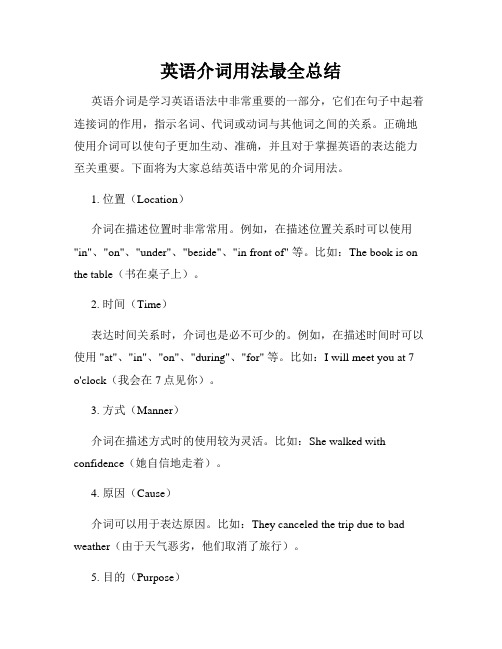
英语介词用法最全总结英语介词是学习英语语法中非常重要的一部分,它们在句子中起着连接词的作用,指示名词、代词或动词与其他词之间的关系。
正确地使用介词可以使句子更加生动、准确,并且对于掌握英语的表达能力至关重要。
下面将为大家总结英语中常见的介词用法。
1. 位置(Location)介词在描述位置时非常常用。
例如,在描述位置关系时可以使用"in"、"on"、"under"、"beside"、"in front of" 等。
比如:The book is on the table(书在桌子上)。
2. 时间(Time)表达时间关系时,介词也是必不可少的。
例如,在描述时间时可以使用 "at"、"in"、"on"、"during"、"for" 等。
比如:I will meet you at 7 o'clock(我会在7点见你)。
3. 方式(Manner)介词在描述方式时的使用较为灵活。
比如:She walked with confidence(她自信地走着)。
4. 原因(Cause)介词可以用于表达原因。
比如:They canceled the trip due to bad weather(由于天气恶劣,他们取消了旅行)。
5. 目的(Purpose)介词也能表达目的。
比如:He went to the store to buy some groceries (他去商店买些食品)。
6. 所属关系(Possession)介词可以用于表达所属关系。
比如:This book belongs to me(这本书是我的)。
7. 比较(Comparison)在进行比较时,介词也可以派上用场。
比如:I am taller than my sister(我比我妹妹高)。
英语介词的用法
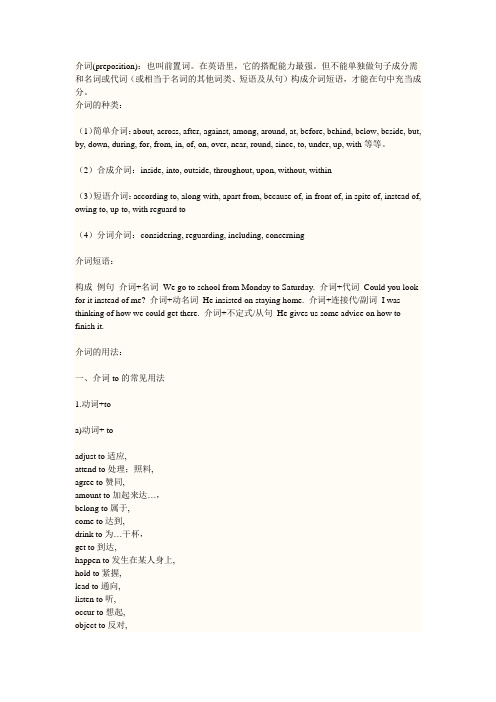
介词(preposition):也叫前置词。
在英语里,它的搭配能力最强。
但不能单独做句子成分需和名词或代词(或相当于名词的其他词类、短语及从句)构成介词短语,才能在句中充当成分。
介词的种类:(1)简单介词:about, across, after, against, among, around, at, before, behind, below, beside, but, by, down, during, for, from, in, of, on, over, near, round, since, to, under, up, with等等。
(2)合成介词:inside, into, outside, throughout, upon, without, within(3)短语介词:according to, along with, apart from, because of, in front of, in spite of, instead of, owing to, up to, with reguard to(4)分词介词:considering, reguarding, including, concerning介词短语:构成例句介词+名词We go to school from Monday to Saturday. 介词+代词Could you look for it instead of me? 介词+动名词He insisted on staying home. 介词+连接代/副词I was thinking of how we could get there. 介词+不定式/从句He gives us some advice on how to finish it.介词的用法:一、介词to的常见用法1.动词+toa)动词+ toadjust to适应,attend to处理;照料,agree to赞同,amount to加起来达…,belong to属于,come to达到,drink to为…干杯,get to到达,happen to发生在某人身上,hold to紧握,lead to通向,listen to听,occur to想起,object to反对,point to指向,respond to回答,refer to参考;指的是…;涉及,reply to回答,see to负责,stick to坚持,turn to求助,write to给某人写信。
英语常用介词及用法
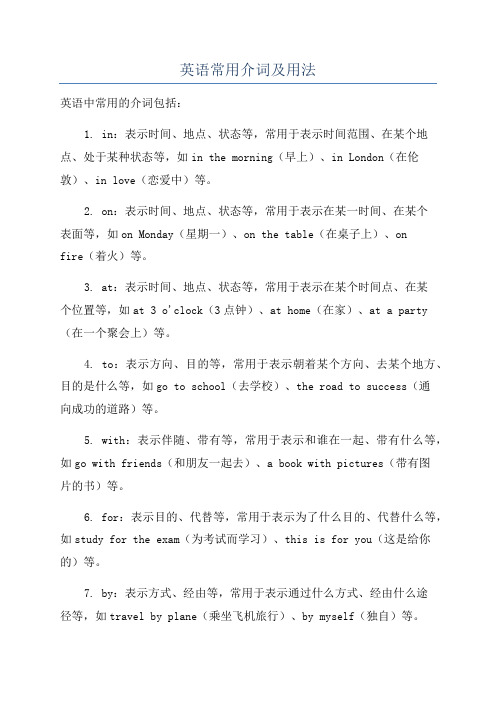
英语常用介词及用法英语中常用的介词包括:1. in:表示时间、地点、状态等,常用于表示时间范围、在某个地点、处于某种状态等,如in the morning(早上)、in London(在伦敦)、in love(恋爱中)等。
2. on:表示时间、地点、状态等,常用于表示在某一时间、在某个表面等,如on Monday(星期一)、on the table(在桌子上)、onfire(着火)等。
3. at:表示时间、地点、状态等,常用于表示在某个时间点、在某个位置等,如at 3 o'clock(3点钟)、at home(在家)、at a party (在一个聚会上)等。
4. to:表示方向、目的等,常用于表示朝着某个方向、去某个地方、目的是什么等,如go to school(去学校)、the road to success(通向成功的道路)等。
5. with:表示伴随、带有等,常用于表示和谁在一起、带有什么等,如go with friends(和朋友一起去)、a book with pictures(带有图片的书)等。
6. for:表示目的、代替等,常用于表示为了什么目的、代替什么等,如study for the exam(为考试而学习)、this is for you(这是给你的)等。
7. by:表示方式、经由等,常用于表示通过什么方式、经由什么途径等,如travel by plane(乘坐飞机旅行)、by myself(独自)等。
8. of:表示所属、材料等,常用于表示属于什么、由什么材料等,如the book of John(约翰的书)、a cup of tea(一杯茶)等。
10. with:表示附带条件或伴随状况,常用于表述某些含义,如join with sb. to do sth.(和某人一起做某事)、in line with sth.(与某事意见相符)等。
这些介词的用法比较广泛,需要根据具体语境进行使用。
介词英语用法
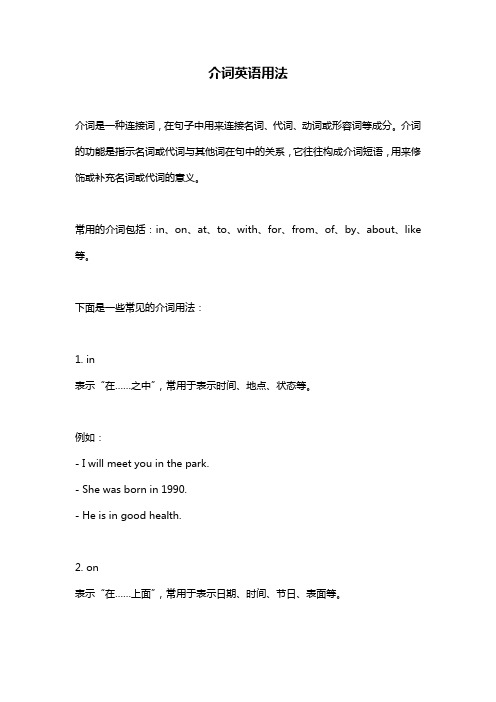
介词英语用法介词是一种连接词,在句子中用来连接名词、代词、动词或形容词等成分。
介词的功能是指示名词或代词与其他词在句中的关系,它往往构成介词短语,用来修饰或补充名词或代词的意义。
常用的介词包括:in、on、at、to、with、for、from、of、by、about、like 等。
下面是一些常见的介词用法:1. in表示“在……之中”,常用于表示时间、地点、状态等。
例如:- I will meet you in the park.- She was born in 1990.- He is in good health.2. on表示“在……上面”,常用于表示日期、时间、节日、表面等。
例如:- The book is on the table.- We will have a party on Christmas Day.- I usually go to bed on time.3. at表示“在……的地点、时间或情况”,常用于表示时间、地点、活动等。
例如:- We will meet at the station at 7 o'clock.- He is good at playing basketball.- I am at home now.4. to表示“到达”,常用于表示动作的方向。
例如:- I am going to the store.- He went to the park to play basketball.- She is walking to the school.5. with表示“带有……”,常用于表示伴随、附带等。
例如:- I went to the movies with my friends.- She is wearing a dress with flowers on it.- He plays the guitar with great skill.6. for表示“为了……”,常用于表示目的、原因、价值等。
英语介词用法大全

英语介词用法大全一、介词preposition缩写prep,又叫前置词,表示其后的名词或代词(或是相当于名词的其他短语或从句)与其他句子成分的关系。
介词是一种虚词,不能单独在句中作成分。
二. 常用介词用法区分:1、in, on, to表示地理位置:in表示在某范围内,on指与什么毗邻,to指在某环境范围之外;2、on, in表示“在…上”时:on只表示在某物的表面上,in表示占去某物一部分;3、through, across都表示“穿过”时:through表示从内部通过,与in有关,across表示在表面上通过,与on有关;4、since, from表示表示时间时:since 指从过去到现在的一段时间,和完成时连用,from指从时间的某一点开始;5、in, on, at表示时间时:at表示片刻的时间,in表示一段的时间,on总是与日子有关;6、in, after表示时间时:in指在一段时间之后,after表示某一具体时间点之后或用在过去时的一段时间中;7、about, on表示“关于”时:about指涉及到,on指专门论述;8、besides与except表示“除了”:besides指“除了…还有再加上”,except指“除了,减去什么”,不放在句首;9、between与among表示“在两者之间”:between表示在两者之间,among用于三者或三者以上的中间;10、in, with表示“用”时:with表示具体的工具,in表示材料,方式,方法,度量,单位,语言,声音;11、in与into表示在里面:in通常表示位置(静态),into表示动向,不表示目的地或位置。
12、as与like:as意为“作为,以…地位或身份”,like为“象…一样”,指情形相似;三、介词用法口诀1、年月周前要用in,遇到几号用on,上午下午又是in.要说某日上下午,on换成in,午夜黄昏用at,黎明用它也不借。
at也在时分前,说“差”要用to,说“过”用part。
英语 介词用法
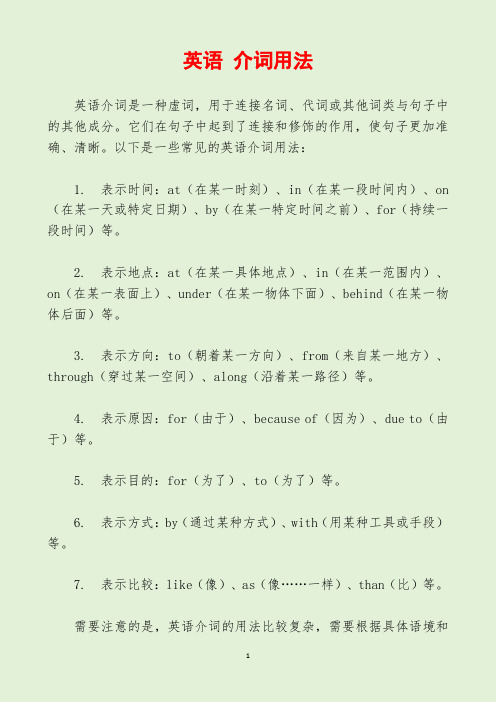
英语介词用法
英语介词是一种虚词,用于连接名词、代词或其他词类与句子中的其他成分。
它们在句子中起到了连接和修饰的作用,使句子更加准确、清晰。
以下是一些常见的英语介词用法:
1. 表示时间:at(在某一时刻)、in(在某一段时间内)、on (在某一天或特定日期)、by(在某一特定时间之前)、for(持续一段时间)等。
2. 表示地点:at(在某一具体地点)、in(在某一范围内)、on(在某一表面上)、under(在某一物体下面)、behind(在某一物体后面)等。
3. 表示方向:to(朝着某一方向)、from(来自某一地方)、through(穿过某一空间)、along(沿着某一路径)等。
4. 表示原因:for(由于)、because of(因为)、due to(由于)等。
5. 表示目的:for(为了)、to(为了)等。
6. 表示方式:by(通过某种方式)、with(用某种工具或手段)等。
7. 表示比较:like(像)、as(像……一样)、than(比)等。
需要注意的是,英语介词的用法比较复杂,需要根据具体语境和
句子结构来判断使用哪一个介词。
在学习和使用介词时,需要多读多练,逐渐掌握其用法。
英语中所有介词的用法
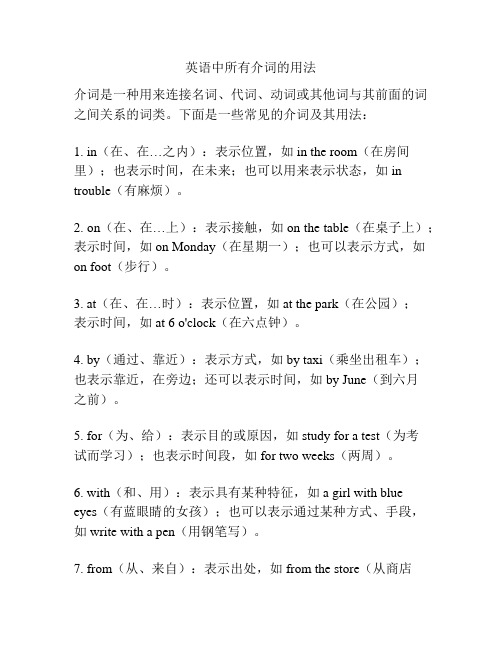
英语中所有介词的用法
介词是一种用来连接名词、代词、动词或其他词与其前面的词之间关系的词类。
下面是一些常见的介词及其用法:
1. in(在、在…之内):表示位置,如in the room(在房间里);也表示时间,在未来;也可以用来表示状态,如in trouble(有麻烦)。
2. on(在、在…上):表示接触,如on the table(在桌子上);表示时间,如on Monday(在星期一);也可以表示方式,如on foot(步行)。
3. at(在、在…时):表示位置,如at the park(在公园);
表示时间,如at 6 o'clock(在六点钟)。
4. by(通过、靠近):表示方式,如by taxi(乘坐出租车);也表示靠近,在旁边;还可以表示时间,如by June(到六月
之前)。
5. for(为、给):表示目的或原因,如study for a test(为考
试而学习);也表示时间段,如for two weeks(两周)。
6. with(和、用):表示具有某种特征,如a girl with blue
eyes(有蓝眼睛的女孩);也可以表示通过某种方式、手段,
如write with a pen(用钢笔写)。
7. from(从、来自):表示出处,如from the store(从商店
里);表示起点,如from London(从伦敦)。
8. to(到、向):表示目的地,如go to school(去学校);表示方向,如face to the north(面朝北方)。
这只是一部分介词的使用方法,介词的用法还有很多,需要根据具体语境来理解和运用。
英语中介词的意思及用法

英语中介词的意思及用法英语中介词是冠词、代词、数词、动词等做状语、定语、表语等作用时,连接他们的词语。
在英语中,介词绝大多数都有主语和宾语,表示主语和宾语之间的一种关系。
英语中介词分为常用介词和少用介词。
一、常用介词常用介词有in, on, at, from, to, with, for, of, in front of, behind, under, over, above, below, along, between, among, before, after, through, across, during, beside, by等。
1、inin表示“在...之内”的意思,表示物体的物理位置,或者表示状态,或者表示某一段时间之内。
例如:The book is in the classroom. 书在教室里。
She was in the hospital last week.上星期在医院里。
2、onon表示“在...上面”的意思,一般表示物体的物理位置,或者某处正在进行的活动。
例如:The book is on the table. 书在桌子上。
They are having a meeting on the fourth floor. 他们正在四楼开会。
3、atat表示“在...旁边”的意思,表示物体的物理位置。
例如:The girl is at the window.孩在窗户旁边。
4、fromfrom表示“从...起”的意思,表示某处的起始点。
例如:She comes from China.来自中国。
5、toto表示“至...终点”的意思,表示某处的终点。
例如:He is going to the station. 他正去车站。
6、withwith表示“和...一起”的意思,一般表示一起行动或一起出现的情况,也可以表示和某人有某种特定的关系。
例如:The children are playing with their teacher.子们和老师一起玩。
介词 超全的英语介词用法归纳总结~优秀6篇
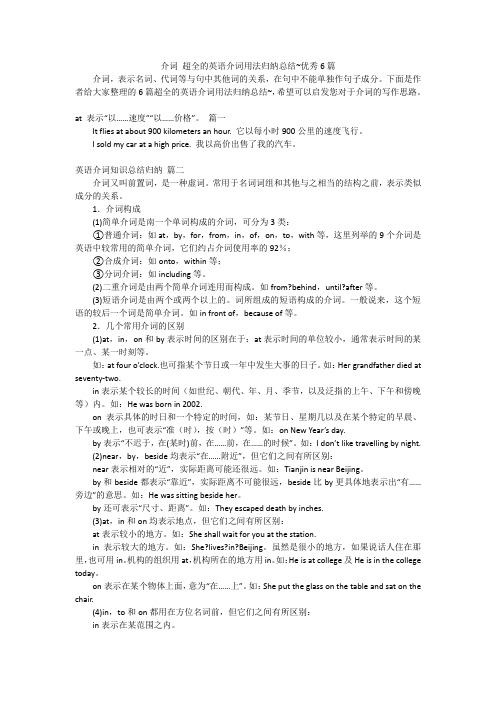
介词超全的英语介词用法归纳总结~优秀6篇介词,表示名词、代词等与句中其他词的关系,在句中不能单独作句子成分。
下面是作者给大家整理的6篇超全的英语介词用法归纳总结~,希望可以启发您对于介词的写作思路。
at 表示“以……速度”“以……价格”。
篇一It flies at about 900 kilometers an hour. 它以每小时900公里的速度飞行。
I sold my car at a high price. 我以高价出售了我的汽车。
英语介词知识总结归纳篇二介词又叫前置词,是一种虚词。
常用于名词词组和其他与之相当的结构之前,表示类似成分的关系。
1.介词构成(1)简单介词是南一个单词构成的介词,可分为3类:①普通介词:如at,by,for,from,in,of,on,to,with等,这里列举的9个介词是英语中较常用的简单介词,它们约占介词使用率的92%;②合成介词:如onto,within等;③分词介词:如including等。
(2)二重介词是由两个简单介词连用而构成。
如from?behind,until?after等。
(3)短语介词是由两个或两个以上的。
词所组成的短语构成的介词。
一般说来,这个短语的较后一个词是简单介词。
如in front of,because of等。
2.几个常用介词的区别(1)at,in,on和by表示时间的区别在于:at表示时间的单位较小,通常表示时间的某一点、某一时刻等。
如:at four o’clock.也可指某个节日或一年中发生大事的日子。
如:Her grandfather died at seventy-two.in表示某个较长的时间(如世纪、朝代、年、月、季节,以及泛指的上午、下午和傍晚等)内。
如:He was born in 2002.on表示具体的时日和一个特定的时间,如:某节日、星期几以及在某个特定的早晨、下午或晚上,也可表示“准(时),按(时)”等。
- 1、下载文档前请自行甄别文档内容的完整性,平台不提供额外的编辑、内容补充、找答案等附加服务。
- 2、"仅部分预览"的文档,不可在线预览部分如存在完整性等问题,可反馈申请退款(可完整预览的文档不适用该条件!)。
- 3、如文档侵犯您的权益,请联系客服反馈,我们会尽快为您处理(人工客服工作时间:9:00-18:30)。
to的用法:一:表示相对,针对be strange (common, new, familiar, peculiar, distinct, sensitive, immune, vulnerable, indispensable) toAir is indispensable to life.Aircrafts are vulnerable to interference caused by radiation.This injection will make you immune to infection.二:表示对比,比较1:以-ior结尾的形容词,后接介词to表示比较,如:superior ,inferior,prior,senior,junior The quarrel happened prior to my arrival.2: 一些本身就含有比较或比拟意思的形容词,如equal,similar,equivalent,analogous A is similar to B in many ways.3:表示一些先后顺序的形容词,如:second,subsequent,next,preliminary,preparatory Subsequent to the war,they returned to their hometown.4: to也偶尔出现在个别动词之后,与动词形成固定词组,表示比较,如:prefer to,compare to,in contrast tocompare to sth.表示比喻或比拟,而compare with sth.表示比较,如:World is usually compared to a stageCompared with his past,he has changed a lot.Prefer的正确句型是:prefer A to B或prefer doing A to doing B,但当prefer后接动词不定式时,表示比较的介词to就要改成rather than ,如:The undaunted soldier preferred death to surrender.Many people prefer spending money to earning money.They prefer to pursue careers rather than remain home as house wives.5: to与及个别的名词构成比较之意,如:alternativeGoing to an under water concert is a great alternative to going to dinner.三: 表示修饰关系1: 表示回复,反应意思的词,如:answer to question,solution to problem,response to inquiry,reaction to proposal,reply to letter2: 表示建筑构件的词汇,如: entry,entrance,approach,access,passage,exit,vent,paththe approach to a bridge引桥the approach to scienceHalf of the population was estimated to have no access to the health service.The access to education 接受教育的机会The access to medical care 享受公费医疗的权利3: 表示人物职位和官衔的词,如:assistant to manager, ambassador to Spain, successor to tradition, heir tothrone,deputy to the National People’s Congressadvisor to the Prime Minister4: 表示权利和许可的词汇,如:right,admission给大家推荐一个英语微信群-Empty Your Cup英语微信群是目前学习英语最有效的方法,群里都是说英语,没有半个中文,而且规则非常严格,是一个超级不错的英语学习环境,群里有好多英语超好的超牛逼的人,还有鬼佬和外国美眉。
其实坦白说,如果自己一个人学习英语太孤独,太寂寞,没有办法坚持,好几次都会半途而废。
只要你加入到那个群里以后,自己就会每天都能在群里坚持学,坚持不停地说和练,由于是付费群,群里的成员学习氛围非常强,每天的训练度都非常猛,本来很懒惰的你一下子就被感染了,不由自主地被带动起来参与操练,不好意思偷懒,别人的刻苦学习精神会不知不觉影响你,Empty Your Cup英语微信群(进群加喂新 601332975)可以彻底治好你的拖延症,里面学员都非常友好,总是给你不断的帮助和鼓励,让你在学英语的路上重新燃起了斗志,因为每天都在运用,你的英语口语就能得到了迅猛的提升,现在可以随便给一个话题,都能用英文滔滔不绝的发表5分钟以上对这个话题的看法和观点,想提高英语口语的 可以加入进来,It really works very well.The employee finally got the admission to the boardroom.Everyone has an equal right to ……..5: 表示栅栏或障碍的词汇,如:bars to development,the barrier to progress6: 表示与书籍,文本相关的词,如:introduction to passage.7: 表示恭喜或是祝贺,如:The director proposed a toast to the health of the guests.Let’s drink to Dick’s success in business8: 另外还有一些名词符合这种用法,有的具有两者息息相关,缺一不可的含义.如:key to door,invitation toparty,guide to action,limitation to life,accessory to school四: to还具有依据,伴随,和着节奏的含义,如:sing to piano, chance to the tune, stamp to the rhythm of the song, add salt to taste(一):表示相关联,相连接,如:be related to,be relative to,in relation to,be relevant to,link toInvestigate all the facts related to the problem.People often linked walth to happiness.(二):表示反对和赞同。
1:to引导的表示反对,抗拒,对抗意义的词组。
Be opposed to,be oppsist to,be contrary to,be adverse to,beresistant to,be contradictory to,object to,oppose to,deny tp,be aline toThese buildings are resistant to earthquake.They are to tally opposed to any changes being made in the plans.2: to引导的表示同意,赞同意义的词组:consent to,subseribe to,The employer consented to give him a salary raise.表示调整,使符合,使适应的含义,如:adapt to,commodate to, adjust to,conformto,habituate to,fit to,suitto,correspond to,cater toShe tried to habituate herself to the style of plain living.Your action should conform to the interests of the people.They offered various foods to cater to the need of customers.His words doesn’t fit to his actions.Suit your writing style to the masses.3: 表示投降,屈服,服从的含义,如:be subject to,be subordinate to,submit to,subjectto,surrender to,give into,confess to,admit to.The minority is subordinate to the majority少数服从多数Countries nearby oceans are always subject to earthquake.He confessed to having robbed the woman of her wallet.We’re not the kind of people to yield to any military threat.五: 表示趋势或倾向,如:tend to,be prone to,be inclined to,be apt to,be liable toHe’s liable to seasickness.You are liable to come to wrong conclusion.六: 表示对事情的坚持与执着,如:sick to,hold o,adhere to,cling toHe still holds on to his original views.七: 表示约束,局限,如:limit to,confine to,resrict toHe’s confined to the house by illness.He confined his remarks to scientific mangement.八: 表示一种习惯或是一种适应性,如:get (be) to,used to,be accustomed toFinally,the students got used to my teaching method.九: 表示起因和原由,如:owing to,due to,thanks to,attribute to,come down toThe flight was cancelled due to the thick fog.The famous artist attributed his success to his wife.十: 表示目的或结果,如:aim to,lead to,give rise toI aim to be an excellent college teacher.His conceit lead to his failure.These bad condition has given rise to a lot of crises十一: 表示命运,注定,如:be doomed to,be destined to,All military adventures by the two super powers are doomed to fail.十二: 表示数量上的积累或增加,如:in addition to,add to,amount toIn addition to relief supplies,he also presented with some money.The annual output of steel amounts to 1200 tons.十三: 表示全身心投入的含义,如:be addicted to,contribute to,devote to,commit toHe is determined to devote all his life to his.十四: 表示展望或是回顾,如:look forward to反date back toThe church dates back to the 13th century.十五: 表示方位概念.如:close to,next toI don’t like wool next to my skin.十六: 表示依靠或借助,如:resort to,turn to,appeal to,He usually appeals to arms to settle the territory dispute.十七: 表示有关注,关于: as to,with regard to十八: 表示关注或重视,如:pay attention to,attach to,We should attach primary importance to job training.十九: 表示依据或是根据,如:according to,in proportion toAccording to today’s newspaper,the match will be postponed.The lending countries subscribe towards capital stock in proportion to heir economic importance.二十: 表示应该或必须含义的句式, 如:It’s time to get up.We are supposed to get here at seven.It’s up to this country to ban nuclear weapons.常用词组respond to(反应), appeal to(吸引), catch on to(理解), listen to (收听),used to (过去常常), give birth to,attend to(照料), see to(负责), be entitled to(有权),belong to(属于), come to(苏醒), stand up to(勇敢面对), help oneself to(请自便), refer to,to the point(切题),Train them to stand up to any severe test in hard.The ticket entitled you to a free meal in the luxury hotel.See to it that the children get a hot meal after their swim.You will catch on to the job shortly after wards.People usually refer to television for up-to-the-minute news.介词的用法:上午、晚要用in,at黎明、午夜、点与分。
